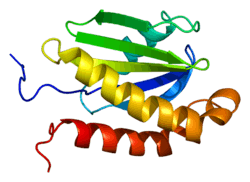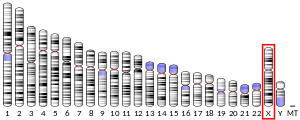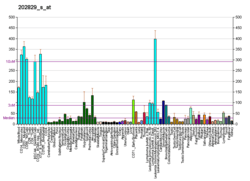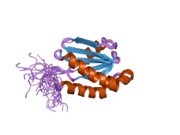SYBL1
Synaptobrevin-like protein 1 (SYBL1), also known as Vesicle-associated membrane protein 7 (VAMP7), is a protein that in humans is encoded by the VAMP7, or SYBL1, gene.[4][5][6]
Function
SYBL1 is a transmembrane protein that is a member of the soluble N-ethylmaleimide-sensitive factor attachment protein receptor (SNARE) family. SYBL1 localizes to late endosomes and lysosomes and is involved in the fusion of transport vesicles to their target membranes.[6]
Interactions
SYBL1 has been shown to interact with SNAP23[7][8] and AP3D1.[7]
gollark: I don't see why you wouldn't want it as a web application.
gollark: So I could have a page `Bee` on bees saying```Bee bee bee apioform, but bees and apioforms are only strongly correlated - they are not, as widely believed, identical.```and a page `Bee density` saying```Bee density is the density of bees. [[some include syntax goes here:Bee]]```and it'd include the `Bee` page.
gollark: It means including the contents of a page in another page.
gollark: I am probably not actually adding a scripting language, but I *am* ideally doing transclusion at some point, structured data, and an export button.
gollark: I refuse to implement a dedicated mobile app and Minoteaur is a "wiki-styled" note-taking application for a reason.
References
- GRCh38: Ensembl release 89: ENSG00000124333 - Ensembl, May 2017
- "Human PubMed Reference:". National Center for Biotechnology Information, U.S. National Library of Medicine.
- "Mouse PubMed Reference:". National Center for Biotechnology Information, U.S. National Library of Medicine.
- D'Esposito M, Ciccodicola A, Gianfrancesco F, Esposito T, Flagiello L, Mazzarella R, Schlessinger D, D'Urso M (Jul 1996). "A synaptobrevin-like gene in the Xq28 pseudoautosomal region undergoes X inactivation". Nat. Genet. 13 (2): 227–9. doi:10.1038/ng0696-227. PMID 8640232.
- Filippini F, Rossi V, Galli T, Budillon A, D'Urso M, D'Esposito M (Jul 2001). "Longins: a new evolutionary conserved VAMP family sharing a novel SNARE domain". Trends Biochem. Sci. 26 (7): 407–9. doi:10.1016/S0968-0004(01)01861-8. PMID 11440841.
- "Entrez Gene: SYBL1 synaptobrevin-like 1".
- Martinez-Arca S, Rudge R, Vacca M, Raposo G, Camonis J, Proux-Gillardeaux V, Daviet L, Formstecher E, Hamburger A, Filippini F, D'Esposito M, Galli T (Jul 2003). "A dual mechanism controlling the localization and function of exocytic v-SNAREs". Proc. Natl. Acad. Sci. U.S.A. 100 (15): 9011–6. doi:10.1073/pnas.1431910100. PMC 166429. PMID 12853575.
- Galli T, Zahraoui A, Vaidyanathan VV, Raposo G, Tian JM, Karin M, Niemann H, Louvard D (Jun 1998). "A novel tetanus neurotoxin-insensitive vesicle-associated membrane protein in SNARE complexes of the apical plasma membrane of epithelial cells". Mol. Biol. Cell. 9 (6): 1437–48. doi:10.1091/mbc.9.6.1437. PMC 25366. PMID 9614185.
Further reading
- Maruyama K, Sugano S (1994). "Oligo-capping: a simple method to replace the cap structure of eukaryotic mRNAs with oligoribonucleotides". Gene. 138 (1–2): 171–4. doi:10.1016/0378-1119(94)90802-8. PMID 8125298.
- Suzuki Y, Yoshitomo-Nakagawa K, Maruyama K, Suyama A, Sugano S (1997). "Construction and characterization of a full length-enriched and a 5'-end-enriched cDNA library". Gene. 200 (1–2): 149–56. doi:10.1016/S0378-1119(97)00411-3. PMID 9373149.
- Galli T, Zahraoui A, Vaidyanathan VV, Raposo G, Tian JM, Karin M, Niemann H, Louvard D (1998). "A novel tetanus neurotoxin-insensitive vesicle-associated membrane protein in SNARE complexes of the apical plasma membrane of epithelial cells". Mol. Biol. Cell. 9 (6): 1437–48. doi:10.1091/mbc.9.6.1437. PMC 25366. PMID 9614185.
- Advani RJ, Yang B, Prekeris R, Lee KC, Klumperman J, Scheller RH (1999). "VAMP-7 mediates vesicular transport from endosomes to lysosomes". J. Cell Biol. 146 (4): 765–76. doi:10.1083/jcb.146.4.765. PMC 2156136. PMID 10459012.
- Matarazzo MR, Cuccurese M, Strazzullo M, Vacca M, Curci A, Miano MG, Cocchia M, Mercadante G, Torino A, D'Urso M, Ciccodicola A, D'Esposito M (1999). "Human and mouse SYBL1 gene structure and expression". Gene. 240 (1): 233–8. doi:10.1016/S0378-1119(99)00375-3. PMID 10564831.
- Ciccodicola A, D'Esposito M, Esposito T, Gianfrancesco F, Migliaccio C, Miano MG, Matarazzo MR, Vacca M, Franzè A, Cuccurese M, Cocchia M, Curci A, Terracciano A, Torino A, Cocchia S, Mercadante G, Pannone E, Archidiacono N, Rocchi M, Schlessinger D, D'Urso M (2000). "Differentially regulated and evolved genes in the fully sequenced Xq/Yq pseudoautosomal region". Hum. Mol. Genet. 9 (3): 395–401. doi:10.1093/hmg/9.3.395. PMID 10655549.
- Ward DM, Pevsner J, Scullion MA, Vaughn M, Kaplan J (2000). "Syntaxin 7 and VAMP-7 are soluble N-ethylmaleimide-sensitive factor attachment protein receptors required for late endosome-lysosome and homotypic lysosome fusion in alveolar macrophages". Mol. Biol. Cell. 11 (7): 2327–33. doi:10.1091/mbc.11.7.2327. PMC 14922. PMID 10888671.
- Hartley JL, Temple GF, Brasch MA (2000). "DNA cloning using in vitro site-specific recombination". Genome Res. 10 (11): 1788–95. doi:10.1101/gr.143000. PMC 310948. PMID 11076863.
- Antonin W, Holroyd C, Fasshauer D, Pabst S, Von Mollard GF, Jahn R (2000). "A SNARE complex mediating fusion of late endosomes defines conserved properties of SNARE structure and function". EMBO J. 19 (23): 6453–64. doi:10.1093/emboj/19.23.6453. PMC 305878. PMID 11101518.
- Wade N, Bryant NJ, Connolly LM, Simpson RJ, Luzio JP, Piper RC, James DE (2001). "Syntaxin 7 complexes with mouse Vps10p tail interactor 1b, syntaxin 6, vesicle-associated membrane protein (VAMP)8, and VAMP7 in b16 melanoma cells". J. Biol. Chem. 276 (23): 19820–7. doi:10.1074/jbc.M010838200. PMID 11278762.
- Antonin W, Fasshauer D, Becker S, Jahn R, Schneider TR (2002). "Crystal structure of the endosomal SNARE complex reveals common structural principles of all SNAREs". Nat. Struct. Biol. 9 (2): 107–11. doi:10.1038/nsb746. hdl:11858/00-001M-0000-0012-F459-F. PMID 11786915.
- Müller DJ, Schulze TG, Jahnes E, Cichon S, Krauss H, Kesper K, Held T, Maier W, Propping P, Nöthen MM, Rietschel M (2002). "Association between a polymorphism in the pseudoautosomal X-linked gene SYBL1 and bipolar affective disorder". Am. J. Med. Genet. 114 (1): 74–8. doi:10.1002/ajmg.10115. PMID 11840509.
- Bogdanovic A, Bennett N, Kieffer S, Louwagie M, Morio T, Garin J, Satre M, Bruckert F (2002). "Syntaxin 7, syntaxin 8, Vti1 and VAMP7 (vesicle-associated membrane protein 7) form an active SNARE complex for early macropinocytic compartment fusion in Dictyostelium discoideum". Biochem. J. 368 (Pt 1): 29–39. doi:10.1042/BJ20020845. PMC 1222979. PMID 12175335.
- Matarazzo MR, De Bonis ML, Gregory RI, Vacca M, Hansen RS, Mercadante G, D'Urso M, Feil R, D'Esposito M (2002). "Allelic inactivation of the pseudoautosomal gene SYBL1 is controlled by epigenetic mechanisms common to the X and Y chromosomes". Hum. Mol. Genet. 11 (25): 3191–8. doi:10.1093/hmg/11.25.3191. PMID 12444103.
- Martinez-Arca S, Rudge R, Vacca M, Raposo G, Camonis J, Proux-Gillardeaux V, Daviet L, Formstecher E, Hamburger A, Filippini F, D'Esposito M, Galli T (2003). "A dual mechanism controlling the localization and function of exocytic v-SNAREs". Proc. Natl. Acad. Sci. U.S.A. 100 (15): 9011–6. doi:10.1073/pnas.1431910100. PMC 166429. PMID 12853575.
- Di Leva F, Ferrante MI, Demarchi F, Caravelli A, Matarazzo MR, Giacca M, D'Urso M, D'Esposito M, Franzé A (2004). "Human synaptobrevin-like 1 gene basal transcription is regulated through the interaction of selenocysteine tRNA gene transcription activating factor-zinc finger 143 factors with evolutionary conserved cis-elements". J. Biol. Chem. 279 (9): 7734–9. doi:10.1074/jbc.M308140200. PMID 14672948.
- Rao SK, Huynh C, Proux-Gillardeaux V, Galli T, Andrews NW (2004). "Identification of SNAREs involved in synaptotagmin VII-regulated lysosomal exocytosis". J. Biol. Chem. 279 (19): 20471–9. doi:10.1074/jbc.M400798200. PMID 14993220.
External links
- Overview of all the structural information available in the PDB for UniProt: P51809 (Vesicle-associated membrane protein 7) at the PDBe-KB.
This article incorporates text from the United States National Library of Medicine, which is in the public domain.
This article is issued from Wikipedia. The text is licensed under Creative Commons - Attribution - Sharealike. Additional terms may apply for the media files.




